
VDL Hapro bv
P.O. Box 73, 4420 AC Kapelle, The Netherlands
www.vdlhapro.com
© VDL Hapro bv - 27002 rev. 04 / 2012
NED
Waarschuwingen en instructies
Dank u voor de aanschaf van een HAPRO dakko er. Om ervoor te zorgen dat u
jarenlang plezier heeft van uw nieuwe dakko er, is het noodzakelijk om de
richtlijnen in deze montage -en gebruikershandleiding te volgen. Wij raden u aan
dit document te bewaren in uw voertuig.
Montage van de dakko er • Gebruik de dakkoff er alleen in combinatie met
dakdragers die internationaal genormeerd en goedgekeurd zijn. • Neem bij
montage van de dakdragers altijd de aanwijzingen van voertuigfabrikant en
dakdragerfabrikant in acht. De aanbevolen afstand tussen de dakdragers is 70 cm.
Openen en sluiten • Belaad de dakkoff er niet te vol, het deksel van de dakkoff er
dient op een eenvoudige en gelijkmatige wijze gesloten te kunnen worden. •
Neem de sleutel na het afsluiten van de dakkoff er uit het slot. Controleer voor het
wegrijden altijd of het deksel goed gesloten is.
Het beladen van de dakko er • De door de autofabrikant voorgeschreven
daklast van uw auto (zie het instructieboek van de auto) mag nooit worden
overschreden. Houd er rekening mee dat u het gewicht van de dakdrager plus het
gewicht van de dakkoff er en het gewicht van de belading van de dakkoff er bij
elkaar moet optellen en dit totaal dus niet de maximaal toegestane belading mag
overschrijden. (b) • De belading van de dakkoff er moet zo gelijkmatig mogelijk
verdeeld worden. Overschrijd de maximale belasting van de dakkoff er niet. (a)
Plaats zware bagage boven de twee dragers in het midden van de dakkoff er. • De
dakkoff er is niet geschikt voor het vervoeren van dieren of gevaarlijke stoff en.
Onderhoud • Maak de dakkoff er na gebruik goed schoon en bewaar deze op een
schone en droge plaats, buiten bereik van direct zonlicht. • Reinig de dakkoff er met
schoon water, eventueel met een autoshampoo. • Gebruik nooit een poetsmiddel,
olie, oplosmiddel, of een alcohol-, chloor- of ammoniakhoudend schoonmaakmiddel
om de dakkoff er te reinigen of vlekken te verwijderen. Deze middelen beïnvloeden
de samenstelling van het kunststof en leiden tot onherstelbare beschadigingen en/
of verkleuringen. (c) • Langdurige blootstelling aan UV straling kan leiden tot
verkleuring van de dakkoff er.
De invloed van een dakko er op het rijgedrag van uw auto • Het rijgedrag
en de wegligging van uw auto worden door de dakkoff er beïnvloed. Dit betreft
onder andere gevoeligheid voor zijwind, bochten en remgedrag. De rijstijl dient
daarop te worden aangepast. De maximale rijsnelheid van 130 km/uur mag niet
worden overschreden. Pas uw snelheid aan bij sterke zijwind, het inrijden en
verlaten van de rijwind van vrachtwagens, het passeren van andere hindernissen
of bij het rijden over bruggen. • Zorg dat de dakkoff er voor vertrek goed gesloten
en vergrendeld is en stevig vast zit. Controleer dit zorgvuldig en bekijk na de eerste
50 km en daarna iedere volgende 500 km of de dakkoff er nog stevig vast zit door
het bevestigingssysteem te controleren op alle vier de punten. Op slechte wegen
dient dit vaker te worden gecontroleerd. • Verwijder de dakdragers en dakkoff er
wanneer u deze niet gebruikt. Zo bespaart u brandstof. • Het geluidsniveau in uw
auto kan hoger zijn tijdens het rijden met de dakkoff er op uw autodak. In welke
mate dit het geval is hangt af van het type auto, de positie van de dakkoff er op het
autodak en het type allesdragers dat wordt gebruikt.
Garantie • De fabrikant is niet aansprakelijk voor schades ontstaan door het niet in
acht nemen van de gebruikershandleiding noch voor schades ontstaan door het
aanbrengen van veranderingen aan de dakkoff er of het gebruik van niet originele
onderdelen. • Voor dit product geldt een fabrieksgarantie van 5 jaar na
aankoopdatum op constructie en onderdelen. • Van garantie zijn uitgesloten:
schades ontstaan door oneigenlijk gebruik, het niet opvolgen van de
gebruikershandleiding, verkleuring van de dakkoff er als gevolg van langdurige
blootstelling aan UV straling of force majeure zoals oorlog, terreuraanslagen,
natuurrampen en dergelijke.
SPA
Advertencias e instrucciones
Gracias por comprar un cofre portaequipajes HAPRO. Para poder disfrutar durante
años de su nuevo cofre portaequipajes, siga las instrucciones de este manual de
montaje y uso. Le recomendamos que guarde este documento dentro de su
vehículo.
Montaje del cofre portaequipajes • Use el cofre únicamente en combinación
con barras de techo normalizadas y con aprobación internacional. • Cuando monte
las barras, siga siempre las instrucciones de los fabricantes del vehículo y de las
propias barras. • La separación recomendada de las barras de techo es 70 cm.
Apertura y cierre • No cargue en exceso el cofre portaequipajes: tenga en cuenta
que debe poder cerrarlo sin que le cueste. • Después de cerrar el cofre, saque la
llave de la cerradura. Antes de ponerse en marcha con el vehículo, verifi que que el
cofre está bien cerrado.
Carga del cofre portaequipajes • No supere en ningún caso el límite de carga del
vehículo según las instrucciones del fabricante (consulte el manual del vehículo).
Tenga en cuenta que tiene que sumar el peso de las barras de techo, el peso del
cofre y el peso de la carga (el equipaje). Este valor total no puede superar la carga
máxima permitida del techo. (b) • La carga debe repartirse uniformemente en el
cofre (en la medida de lo posible). No supere la carga máxima para el cofre
portaequipajes. (a) Coloque los equipajes más pesados sobre las dos barras y
centrados en el cofre. • El cofre no se ha diseñado para transportar animales ni
artículos peligrosos.
Mantenimiento • Después del uso, lave el cofre y guárdelo en un lugar limpio y seco,
no expuesto a la luz solar directa. • Se recomienda limpiar el cofre portaequipajes
después de cada uso. • Para limpiar el cofre, utilice agua del grifo y, si es posible, un
jabón especial para coches. • No utilice nunca los productos siguientes para limpiar
el cofre ni para quitar manchas: detergentes, aceites o disolventes y productos de
limpieza que contengan alcohol, cloruro o amoniaco. Estos productos afectan a la
composición del material sintético y provocarían daños o decoloraciones irreparables.
(c) • La exposición prolongada a la luz UV puede alterar el color del cofre.
In uencia de un cofre portaequipajes en el rendimiento y el manejo del
vehículo • El cofre portaequipajes afecta al control del vehículo y a las características
de adherencia a la carretera. Esto incluye la sensibilidad a los vientos de costado, a las
curvas de la carretera y al comportamiento de frenado. Debe adaptar su estilo de
conducción según corresponda. No se debe superar la velocidad máxima de 130
km/h. Ajuste su velocidad según sea necesario al conducir bajo condiciones de
vientos fuertes, al entrar y salir del rebufo de un camión, pasar por otros obstáculos y
conducir sobre puentes. • Antes de partir, asegúrese de que el cofre portaequipajes
esté cerrado, de que los pestillos estén correctamente colocados y de que el cofre
portaequipajes esté montado con fi rmeza. Compruebe estos aspectos
detenidamente, y revise los cuatro puntos de fi jación para asegurarse de que el cofre
portaequipajes sigue correctamente colocado después de los primeros 50 km y
después de cada 500 km. Si conduce por calzadas en mal estado, realice la
comprobación con más frecuencia. • Desmonte las barras de techo y el cofre cuando
no los utilice. De este modo, ahorrará combustible. • El nivel de ruido del vehículo
puede aumentar al conducir con el cofre portaequipajes en el techo del vehículo. El
grado de esta circunstancia varía en función del tipo de coche, de la posición del
cofre portaequipajes en el techo del vehículo y del tipo de baca que se esté utilizando.
Garantía • El fabricante no es responsable de los daños causados por el incumplimiento
de las instrucciones del manual de usuario ni de los daños provocados por cambios en
el cofre portaequipajes o por el uso de piezas no originales. • La garantía de fábrica de
este producto es de 5 años a partir de la fecha de compra y se aplica a la estructura y a
las piezas. • La garantía no incluye: daños causados por un uso inadecuado,
incumplimiento de las instrucciones del manual de uso, alteración del color o el
material del cofre debida a la exposición prolongada a la luz natural, o daños por causa
de fuerza mayor, como guerras, actos terroristas, desastres naturales, etc.
ENG
Warnings and Instructions
Thank you for purchasing a HAPRO roof box. To ensure that your new roof box gives
you years of pleasure, please follow the guidelines given in these assembly and user
manual. We recommend that you store this document inside your vehicle.
Mounting the roof box • Use the roof box only in combination with roof bars that
are internationally standardized and approved. • Always comply with the
instructions of the car and roof bar manufacturers when mounting the roof bars.
The recommended spacing of the roof bars is 70cm.
Opening and closing • Do not overload the roof box; you should be able to close
the cover of the roof box in an easy and smooth manner. • Take the key out of the
lock after closing the roof box. Before driving off , always check that the cover is
closed well.
Loading the roof box • Never exceed the roof load, which is prescribed by the car
manufacturer (see the instruction booklet of the car). Take into account that you
have to add up the weight of the roof bars, the weight of the roof box, and the
weight of the load. This total may not exceed the maximum permitted load of the
roof. (b) • The load of the roof box must be spread as evenly as possible. Do not
exceed the maximum load for the roofbox. (a) Position heavy luggage above the
two bars in the centre of the roof box. • Your box is not built to carry animals or
hazardous goods.
Maintenance • After use, wash your roof box and store in a clean, dry place, out of
direct sunlight. • Clean the roof box with tap water and possibly with a car shampoo.
• Never use the following products to clean the roof box or to remove stains:
cleaning agents, oil or solvents and cleaning products that contain alcohol,
chloride or ammonia. These products have an impact on the composition of the
synthetic material and result in irreparable damage and/or discolouring. (c) •
Prolonged exposure to UV light may alter the colour of your roof box.
The in uence of a roof box on the performance/handling of your car • The
roof box aff ects your car’s handling and road-holding characteristics. This includes
sensitivity to crosswinds, bends in the road and braking behaviour. You must adapt
your driving style accordingly. The maximum speed of 130 km/h must not be
exceeded. Adjust your speed as necessary when driving in strong winds, entering
and exiting the backdraught of a lorry, passing other obstacles and driving over
bridges. • Before departure ensure that the roof box is closed and latched properly
and mounted securely. Check this carefully, and check all four points again to
ensure that the roof box is still mounted securely after the fi rst 50 km and every 500
km thereafter. Check more frequently on poor road surfaces. • Remove the roof
bars and box when you are not using them. This way you save on fuel. • The noise
level in your car may be higher when driving with the roof box on your car roof. The
degree to which this occurs depends on the type of car, the position of the roof
box on the car roof and the type of roof bars in use.
Warranty • The manufacturer is neither liable for damage caused by the non-
compliance with the user manual nor for damage caused by changes to the roof
box or the use of non-original parts. • The factory’s warranty for this product is 5
years starting from the date of purchase and it applies to construction and parts. •
Excluded from the warranty are: damage caused by improper use, non-compliance
with the user manual, the alteration of the colour or material of the box due to
long-term exposure to natural light or force majeure such as war, acts of terror,
natural disasters, etc.
FRA
Avertissements et instructions
Vous venez d’acquérir un co re de toit HAPRO nous vous en remercions. A n que ce
nouveau co re de toit vous donne entière satisfaction, il est impératif de respecter
cette notice de montage et d’utilisation. Nous vous recommandons de la conserver
à l’intérieur du véhicule.
Montage du co re de toit • Utilisez uniquement le coff re de toit avec les barres
de toit normalisées et agréées au niveau international. • Conformez-vous toujours
aux instructions des fabricants de la voiture et des barres de toit lors du montage
de ces dernières. L’écartement préconisé est de 70 cm.
Ouverture et fermeture • Ne surchargez pas le coff re de toit ; vous devez pouvoir
fermer son couvercle en douceur et sans diffi culté. • Retirez la clé de la serrure après
avoir fermé le coff re de toit. Avant de prendre la route, assurez-vous toujours que
le couvercle est bien fermé.
Chargement du co re de toit • Ne dépassez jamais la charge que peut supporter
le pavillon du véhicule, imposée par le fabricant de voitures (voir le livret
d’instructions de la voiture). Tenez compte du fait que vous devez ajouter le poids
des barres de toit, le poids du coff re de toit et le poids de la charge. Ce total ne peut
pas dépasser la charge maximale autorisée sur le pavillon de votre véhicule. (b) • La
charge du coff re de toit doit être répartie aussi uniformément que possible. Ne
dépassez jamais la charge du coff re de toit. (a) Placez les bagages lourds au-dessus
des deux barres au centre du coff re de toit. • Votre coff re n’est pas adapté au
transport d’animaux, ni au transport de matières dangereuses.
Entretien • Après utilisation, vous devez nettoyer votre coff re et le stocker dans un
espace propre et sec, à l’abri de la lumière naturelle. • Nous recommandons le
nettoyage du coff re de toit après chaque utilisation. • Nettoyez le coff re de toit à
l’eau du robinet et éventuellement avec du shampoing pour voiture. • N’utilisez
jamais les produits suivants pour nettoyer le coff re de toit ou pour enlever les
taches : des agents de nettoyage, de l’huile ou des solvants / produits de nettoyage
qui contiennent de l’alcool, des chlorures ou de l’ammoniac. Ces produits ont un
impact sur la composition de la matière synthétique et pourraient entraîner des
dégâts et/ou une décoloration irréparables. (c) • Une exposition prolongée aux UV
peut altérer la couleur du coff re de toit.
L’in uence d’un co re de toit sur les performances/la conduite de votre
voiture • Le coff re de toit aff ecte les caractéristiques de conduite et de tenue de
route de votre voiture. Ceci inclut une sensibilité aux vents latéraux, les virages et le
comportement de freinage. Vous devez adapter votre style de conduite en
conséquence. Il est déconseillé de dépasser la vitesse maximale de 130 km/h.
Ajustez votre vitesse comme nécessaire lorsque vous conduisez par vent fort,
entrez dans le sillon d’aspiration d’un camion et en sortez, dépassez d’autres
obstacles et traversez des ponts. • Avant le départ, vérifi ez que le coff re de toit est
fermé, correctement verrouillé et solidement fi xé. Eff ectuez cette vérifi cation
soigneusement et revérifi ez l’ensemble des quatre points pour vous assurer que le
coff re de toit est toujours solidement fi xé après 50 km et tous les 500 km suivants.
Procédez à des vérifi cations plus fréquentes sur des routes en mauvais état. •
Enlevez les barres de toit et le coff re lorsque vous ne les utilisez pas. Vous
économiserez ainsi du carburant. • Il se peut que le niveau de bruit dans votre
voiture soit plus élevé lorsque vous conduisez avec le coff re de toit sur le toit de
votre voiture. L’importance de ce phénomène dépend du type de voiture, de la
position du coff re de toit sur le toit de la voiture et du type de barres de toit
utilisées.
Garantie • Le fabricant n’est pas responsable des dégâts causés par le non respect
du mode d’emploi ni des dégâts provoqués par des modifi cations apportées au
coff re de toit ou par l’utilisation de pièces qui ne sont pas d’origine. • La garantie
d’usine sur ce produit est de 5 ans à partir de la date d’achat et elle s’applique à la
construction et aux pièces. • Sont exclus de la garantie : les dégâts causés par une
utilisation inappropriée suite au non respect du mode d’emploi, l’altération de la
couleur et de la matière du coff re due à une exposition prolongée à la lumière
naturelle ou encore dus à des cas de force majeure, notamment la guerre, les actes
de terrorisme, les catastrophes naturelles, etc.
ITA
Avvertenze e Istruzioni
Grazie per aver acquistato un baule da tetto HAPRO Per fare in modo che il vostro
nuovo baule da tetto vi dia anni di piacere, seguite le linee guida fornite nel presente
manuale utente e di montaggio. Vi consigliamo di conservare questo documento
all’interno del vostro veicolo.
Montaggio del box portabagagli • Utilizzare il box portabagagli solo con barre
che siano standardizzate ed approvate a livello internazionale. • Durante il
montaggio delle barre attenersi sempre alle istruzioni fornite dai produttori
dell’auto e delle barre. La distanza consigliata fra le barre del tetto è di 70 cm.
Apertura e chiusura • Non caricare eccessivamente il box portabagagli; il
coperchio del box portabagagli si dovrà chiudere in con facilità e senza sforzare. •
Togliere la chiave dal lucchetto dopo aver chiuso il box portabagagli. Prima di
partire, controllare sempre che il coperchio sia chiuso bene.
Caricamento del box portabagagli • Non superare mai il carico sul tetto, indicato
dal produttore dell’auto (vedere il libretto d’istruzioni dell’auto). Bisogna considerare
che si deve aggiungere il peso delle barre, il peso del box portabagagli ed il peso
del carico. Questo totale non deve superare il carico massimo autorizzato del tetto.
(b) Questo totale non potrà superare il carico massimo consentito. Non superare il
carico massimo per il baule da tetto. (a) • Il carico del box portabagagli va suddiviso
il più possibile all’interno del box stesso. Sistemare i bagagli pesanti sopra le due
barre al centro del box portabagagli. • Questo baule da tetto non è stato progettato
per trasportare animali o merce pericolosa.
Manutenzione • Dopo l’uso, lavare il baule da tetto e riporlo in un luogo pulito ed
asciutto, lontano dalla luce diretta del sole. • Vi consigliamo di pulire il box
portabagagli dopo ogni utilizzo. • Pulire il box portabagagli con acqua del rubinetto
e possibilmente con shampoo per auto. • Non usare mai i seguenti prodotti per
pulire il box portabagagli o per rimuovere eventuali macchie: agenti detergenti,
petrolio o solventi e prodotti detergenti che contengano alcool, cloro o ammoniaca.
Questi prodotti hanno un impatto sulla composizione del materiale sintetico e
causano dei danni irreparabili e/o uno scolorimento. (c) • Un’esposizione prolungata
ai raggi UV potrebbe alterare il colore del baule da tetto.
L’in uenza di un box portabagagli sulle prestazioni/comportamento della
vostra auto • Il baule portatutto sul tetto infl uenza le caratteristiche di guida e
tenuta di strada dell’automobile. Ciò comprende la sensibilità al vento trasversale
e il comportamento in curva e in frenata. Lo stile di guida deve essere adattato di
conseguenza. Non superare la velocità massima di 130 km/h. Moderare la velocità
quanto necessario in presenza di forte vento, quando si entra o si esce dalla scia di
un autocarro, quando si superano altri ostacoli e guidando su ponti e viadotti. •
Prima della partenza, accertarsi che il roof box sia ben chiuso e saldamente fi ssato
al tetto. Controllare questi punti con particolare attenzione, e ricontrollare
nuovamente tutti e quattro i punti di fi ssaggio per assicurarsi che il roof box sia
ancora ben fi ssato dopo i primi 50 km e poi ogni 500 km. Controllare con maggiore
frequenza su superfi ci stradali in cattive condizioni. • Rimuov ere le barre e il box
quando non vengono utilizzati. Così facendo consumerete meno carburante. •
Durante la guida con il roof box montato sul tetto il rumore all’interno
dell’automobile può essere più forte. Il livello di incremento del rumore varia
secondo il tipo di automobile, la posizione del roof box sul tetto dell’abitacolo e il
tipo di barre portatutto utilizzate per il fi ssaggio.
Garanzia • Il produttore non si ritiene responsabile per eventuali danni causati
dalla mancata osservanza del manuale utente né dai danni causati da eventuali
modifi che apportate al box portabagagli o per aver utilizzato parti non originali. •
La garanzia di fabbrica per questo prodotto è di 5 anni a partire dalla data di
acquisto e vale sia per la costruzione che per i pezzi. • Sono esclusi dalla garanzia:
danni causati da un uso improprio, il mancato rispetto del manuale utente,
l’alterazione del colore o del materiale del baule dovuta ad un’esposizione
prolungata alla luce naturale o ad eventi di forza maggiore quali guerra, atti di
terrorismo, catastrofi naturali, ecc.
POL
Ostrzeżenia i instrukcje
Dziękujemy za zakup boksu dachowego HAPRO. Aby nowy boks dachowy zapewnił
Państwu zadowolenie z użytkowania przez wiele lat, prosimy przestrzegać
wskazówek zawartych w niniejszej instrukcji montażu i obsługi. Zalecamy, aby
przechowywać ten dokument w pojeździe.
Montaż boksu dachowego • Boks dachowy należy stosować wyłącznie na
belkach dachowych znormalizowanych i zgodnych z międzynarodowymi
normami. • Montując belki dachowe, należy przestrzegać instrukcji ich producenta
oraz producenta samochodu. • Zalecana odległość między belkami wynosi 70 cm.
Otwieranie i zamykanie • Nie wolno nadmiernie obciążać boksu – jego pokrywa
powinna zamykać się łatwo i bez przeszkód. • Po zamknięciu pokrywy należy wyjąć
kluczyk z zamka. Przed rozpoczęciem podróży należy sprawdzić, czy pokrywa jest
dobrze zamknięta.
Pakowanie bagażnika dachowego • W żadnym wypadku nie wolno przekraczać
dopuszczalnego obciążenia boksu, określonego przez producenta samochodu
(patrz instrukcja samochodu). Należy pamiętać, że masa łączna to waga belek
dachowych, boksu oraz ładunku. Masa łączna nie może przekraczać maksymalnego
dopuszczalnego obciążenia dachu. (b) • Ładunek boksu należy rozłożyć możliwie
równomiernie. Nie przekraczać maksymalnej ładowności boksu. (a) Ciężkie bagaże
należy umieścić na dwóch belkach w centralnej części boksu. • Boks nie jest
przeznaczony do przewożenia zwierząt ani przedmiotów niebezpiecznych.
Konserwacja • Po użyciu boks należy umyć i przechowywać w czystym i suchym
miejscu nienarażonym na bezpośrednie działanie promieni słonecznych. • Boks
powinien być myty po każdym użyciu. • Boks należy przemywać wodą i płynem do
mycia samochodów. • Do czyszczenia boksu i usuwania plam nie wolno stosować
środków czyszczących, oleju lub rozpuszczalników ani środków czyszczących
zawierających alkohol, chlor lub amoniak. Środki te wpływają na skład materiału
syntetycznego i mogą nieodwracalnie zniszczyć i/lub odbarwić boks. (c) •
Przedłużone oddziaływanie promieniowania ultrafi oletowego może spowodować
odbarwienie boksu.
Wpływ bagażnika dachowego na działanie/obsługę samochodu • Kufer
dachowy ma wpływ na prowadzenie samochodu i charakterystykę przyczepności
do jezdni. Oznacza to podatność na boczne podmuchy wiatru, zachowanie na
zakrętach i charakterystykę hamowania. Styl prowadzenia należy odpowiednio
dostosować. Nie należy przekraczać prędkości 130 km/h. Podróżując przy silnych
podmuchach wiatru, ustawiając się w cieniu aerodynamicznym ciężarówki lub
opuszczając go, omijając przeszkody i przejeżdżając przez mosty należy
odpowiednio dostosować prędkość. • Przed wyruszeniem należy się upewnić, że
kufer dachowy jest odpowiednio zamknięty i przytwierdzony. Kontrolę tę należy
przeprowadzić z należytą starannością i ponownie skontrolować wszystkie cztery
punkty po przejechaniu pierwszych 50 km i każdych kolejnych 500 km, aby
upewnić się, że kufer dachowy pozostaje bezpiecznie zamontowany. Kontrole
należy przeprowadzać częściej, jeżeli droga ma złą nawierzchnię. • Belki dachowe i
boks należy demontować, gdy nie są używane. Pozwala to ograniczyć zużycie
paliwa. • Kiedy kufer dachowy jest zamontowany na dachu pojazdu, poziom hałasu
w samochodzie w czasie podróży może być wyższy. Poziom hałasu zależy od typu
samochodu, ustawienie kufra dachowego na jego dachu i typu zastosowanych
relingów dachowych.
Gwarancja • Producent nie odpowiada za szkody spowodowane Nieprzestrzeganiem
niniejszej instrukcji obsługi ani modyfi kacją boksu lub użyciem nieoryginalnych
części. • Gwarancja fabryczna na ten produkt jest ważna pięć lat od daty zakupu i
obejmuje konstrukcję oraz części. • Gwarancja nie obejmuje: uszkodzeń
spowodowanych niewłaściwym użytkowaniem, nieprzestrzeganiem zaleceń
podanych w niniejszej instrukcji użytkownika, odbarwieniami i zmianami właściwości
materiału na skutek długiego oddziaływania naturalnego światła oraz działaniem siły
wyższej – wojny, działań terrorystycznych, klęsk żywiołowych itp.
DEU
Warnhinweise und Gebrauchsanweisung
Vielen Dank, dass Sie sich für den Kauf der Dachbox HAPRO entschieden haben. Um
sicherzustellen, dass Sie sich auch noch nach Jahren an Ihrer neuen Dachbox
erfreuen können, befolgen Sie bitte die in dieser Montage- und Gebrauchsanweisung
enthaltenen Anweisungen. Wir empfehlen, dieses Dokument im Inneren Ihres
Fahrzeugs aufzubewahren.
Montieren der Dachbox • Verwenden Sie die Dachbox nur in Verbindung mit
international genormten und zugelassenen Dachträgern. • Beachten Sie bei der Montage
der Dachträger stets die Anweisungen des Fahrzeug- und Dachträgerherstellers. Der
empfohlene Abstand der Dachträger beträgt 70 cm.
Ö nen und Schließen der Dachbox • Überladen Sie die Dachbox nicht. Der Deckel
der Dachbox sollte sich einfach und mühelos schließen lassen. • Ziehen Sie den
Schlüssel ab, nachdem die Dachbox geschlossen wurde. Kontrollieren Sie stets vor
dem Losfahren, ob der Deckel sicher geschlossen ist.
Beladen der Dachbox • Überschreiten Sie keinesfalls die maximale Dachlast gemäß
Herstellerangaben (siehe Betriebsanleitung des Fahrzeugs). Beachten Sie, dass das
Gewicht von Dachträger, Dachbox und Ladung addiert werden muss. Dieses
Gesamtgewicht darf die zulässige Höchstlast des Daches nicht überschreiten. (b) •
Die Ladung muss in der Dachbox möglichst gleichmäßig verteilt werden.
Überschreiten Sie die zulässige Höchstlast der Dachbox nicht. (a) Positionieren Sie
schweres Gepäck über den beiden Trägern in der Mitte der Dachbox. • Ihre Box ist
nicht dafür ausgelegt, Tiere oder gefährliche Güter zu transportieren.
Wartung • Waschen Sie die Dachbox nach dem Gebrauch aus und bewahren Sie
sie an einen sauberen, trockenen Ort, außerhalb von direktem Sonnenlichts, auf. •
Wir empfehlen die Reinigung der Dachbox nach jedem Gebrauch. • Reinigen Sie
die Dachbox mit Leitungswasser und möglichst mit Autoshampoo. • Verwenden
Sie keinesfalls die folgenden Produkte zum Reinigen der Dachbox oder zum
Entfernen von Flecken: Reinigungsmittel, Öl oder Lösungsmittel sowie alkohol-,
chlorid- oder ammoniakhaltige Reinigungsmittel. Diese Produkte wirken auf die
Zusammensetzung des Kunststoff materials ein und führen zu irreparablen
Schäden und/oder Farbveränderungen. (c) • Wird die Box über einen längeren
Zeitraum direktem Sonnenlicht ausgesetzt, kann die UV-Strahlung zu einer
Veränderung der Farbe Ihrer Dachbox führen.
Ein uss einer Dachbox auf das Fahrverhalten Ihres Fahrzeugs • Die Dachbox
beeinfl usst das Handling und die Straßenlage Ihres Fahrzeugs. Dazu gehören unter
anderem eine stärkere Seitenwindempfi ndlichkeit, eine andere Kurvenlage und ein
anderes Bremsverhalten. Sie müssen Ihren Fahrstil dementsprechend anpassen. Fahren
Sie nicht schneller als 130 km/h. Passen Sie Ihre Geschwindigkeit gegebenenfalls an,
wenn Sie bei starkem Wind fahren, in den/aus dem Windschatten eines LKW hinein-/
herausfahren, an anderen Hindernissen vorbeifahren oder über eine Brücke fahren. •
Vergewissern Sie sich stets vor dem Losfahren, dass die Dachbox geschlossen und sicher
befestigt ist und alle Verschlüsse eingerastet sind. Überprüfen Sie diese Punkte immer
sorgfältig vor jeder Fahrt, und überprüfen Sie nach den ersten 50 km und dann jeweils alle
500 km erneut, ob die Dachbox nach wie vor an allen vier Aufl agepunkten sicher am
Dachgepäckträger befestigt ist. Führen Sie diese Überprüfungen bei schlechter
Fahrbahnbeschaff enheit in kürzeren Abständen durch. • Entfernen Sie Dachträger und
Dachbox bei Nichtgebrauch. Auf diese Weise können Sie Kraftstoff sparen. • Die Fahrt-
und Windgeräusche können sich beim Fahren mit der Dachbox auf Ihrem Fahrzeugdach
verstärken. Das hängt von verschiedenen Faktoren wie Ihrem Fahrzeugtyp, der Position
der Dachbox auf Ihrem Fahrzeugdach und dem verwendeten Dachgepäckträger ab.
Gewährleistung • Der Hersteller haftet weder für Schäden durch Missachtung der
Gebrauchsweisung noch für Schäden aufgrund von Veränderungen an der
Dachbox oder der Verwendung von Nicht-Originalteilen. • Die werkseitige
Gewährleistung für dieses Produkt beträgt 5 Jahre ab Kaufdatum und gilt für
Konstruktion und Teile. • Ausgeschlossen aus der Gewährleistung sind: Schäden
durch unsachgemäße Verwendung, Missachtung der Gebrauchsanweisung,
Veränderungen der Farbe oder des Materials der Box infolge langanhaltender
Exposition von direktem Sonnenlicht oder höhere Gewalt, wie z. B. Krieg, Terrorakte,
Naturkatastrophen usw.
RUS
Меры предосторожности и инструкция по эксплуатации
Благодарим вас за приобретение багажного бокса HAPRO. Чтобы обеспечить
успешную многолетнюю эксплуатацию вашего нового багажного бокса,
следуйте указаниям, приведенным в данной инструкции по сборке и
эксплуатации. Рекомендуется хранить этот документ в автомобиле.
Установка багажного бокса • Используйте багажный бокс исключительно в
комбинации с верхними багажными дугами, которые отвечают международным
стандартам и требованиям. • При установке верхних багажных дуг всегда выпол-
няйте требования инструкции по установке дополнительных принадлежностей
для автомобиля и инструкции изготовителя данного оборудования. Рекомендуе-
мое расстояние между багажными дугами составляет 70 см.
Открывание и закрывание • Никогда не перегружайте багажный бокс, крыш-
ка багажного бокса должна закрываться легко и без особых усилий. • Вынимайте
всегда ключ из замка, прежде чем закрыть багажный бокс. Перед выездом всегда
проверяйте, чтобы крышка бокса хорошо была закрыта.
Загрузка багажного бокса • Вес перевозимого в боксе груза не должен превышать
максимально допустимого веса, предписанного автопроизводителем (ознакомьтесь
с инструкциями автопроизводителя). Примите во внимание, что Вам необходимо
учесть вес багажных дуг, багажного бокса и размещенного в нем груза. Общий вес
всех этих компонентов не должен превышать максимально допустимой нагрузки на
крышу. (b) • Груз должен быть размещен в багажном боксе наиболее равномерным
образом. Не допускайте превышения максимально допустимой нагрузки багажного
бокса. (a) Наиболее тяжелые компоненты груза должны располагаться в центральной
части багажного бокса при применении двух верхних багажных дуг. • Багажный бокс
не предназначен для перевозки животных, а также опасных грузов.
Техобслуживание • После каждого применения промывайте багажный бокс водой. Храни-
те его в чистом сухом месте вне воздействия прямых солнечных лучей. • Мы рекомендуем
Вам очищать багажный бокс от загрязнений после каждого применения. • Мойте багажный
бокс водопроводной водой по возможности с применением специальных моющих средств
для автомобилей. • Запрещается использовать следующие средства для чистки багажного
бокса или для удаления загрязнений: удалители масла или растворители, а также моющие
средства, содержащие спирт, хлорид или аммиак. Данные средства воздействуют негативно
на структуру синтетического материала и приводят к его непоправимому разрушению и/
или обесцвечиванию. (c) • Длительное воздействие ультрафиолетового излучения может
привести к изменению цвета багажного бокса.
Воздействие багажного бокса на работу Вашего автомобиля и его управление
• Установленный на крыше багажник влияет на управляемость и устойчивость авто-
мобиля. Кроме того, автомобиль становится более чувствительным к боковому ветру,
меняется его поведение в поворотах и при торможении. Соответственно, придется
приспособить и Ваш стиль вождения. Максимальная скорость должна быть ограни-
чена 130 км/ч. Вам также будет необходимо ограничить скорость в соответствующих
пределах при сильном ветре, при движении в воздушном потоке за крупногабаритны-
ми грузовыми транспортными средствами, при проезде мимо каких-либо препятствий
и переезде через мост. • Прежде чем отправиться в путь, проверьте, чтобы багажник
на крыше был плотно закрыт, а также надлежащим образом установлен и надежно за-
фиксирован. Внимательно выполните описанные выше действия, также проверив все
четыре точки крепления, чтобы убедиться в по-прежнему надежном креплении багаж-
ника после первых 50 км и каждые 500 км пробега. Если Вы часто передвигаетесь по
плохим дорогам, подобные проверки следует проводить как можно чаще. • Снимайте
багажные дуги и багажный бокс, если Вы их не используете. Это позволит Вам сэконо-
мить горючее. • При установке багажника на крышу может возрасти и уровень шума в
салоне автомобиля во время движения. Уровень шума зависит от марки Вашего авто-
мобиля, положения багажника на крыше, а также типа используемых рейлингов.
Гарантия • Производитель не несет ответственности за ущерб, нанесённый по причине
несоблюдения инструкций по эксплуатации, а также по причине внесенных изменений в
конструкцию багажного бокса или по причине использования неоригинальных деталей
и запчастей. • Заводская гарантия для данного оборудования действительна в течение
5 лет начиная со дня покупки и распространяется как на данное оборудование, так и на
его компоненты. • Действие данной гарантии не распространяется на следующие случаи:
если повреждение оборудования вызвано ненадлежащим использованием данного обо-
рудования, несоблюдением требований инструкции по эксплуатации, изменением цвета
материала, из которого изготовлен багажный бокс, в связи с длительным воздействием
естественного света или обстоятельствами непреодолимой силы, такими как война, терро-
ристические акты, стихийные бедствия и т. д.
POR
Avisos e Instruções
Obrigado por ter adquirido uma Mala de tejadilho HAPRO. Para assegurar que a
sua nova Mala de tejadilho lhe proporciona anos de prazer, cumpra as directrizes
indicadas neste manual do utilizador e de montagem. Recomendamos que guarde
este documento no interior do seu veículo.
Montar a Mala de tejadilho • Utilize a Mala de tejadilho apenas com barras de
tejadilho normalizadas e com aprovação internacional. • Cumpra sempre as
instruções dos fabricantes dos automóveis e das barras de tejadilho quando
montar as barras de tejadilho. O espaçamento recomendado para as barras de
tejadilho é de 70 cm.
Abrir e fechar • Não sobrecarregue a Mala de tejadilho, deve ser possível fechar a
tampa da Mala de tejadilho de uma forma fácil e suave. • Retire a chave da fechadura
depois de fechar a Mala de tejadilho. Antes de se ir embora, verifi que sempre se a
tampa está fechada correctamente.
Carregar a Mala de tejadilho • Nunca exceda a carga do tejadilho, que é prescrita
pelo fabricante do automóvel (consulte o folheto de instruções do automóvel).
Não se esqueça de que tem de adicionar o peso das barras de tejadilho, o peso da
Mala de tejadilho e o peso da carga. Este total não pode exceder a carga máxima
permitida do tejadilho. (b) • Tem de arrumar a carga da Mala de tejadilho o mais
equilibradamente possível. Não exceda a carga máxima para a Mala de tejadilho.
(a) Posicione a bagagem pesada por cima das duas barras no centro da Mala de
tejadilho. • A sua caixa não foi concebida para transportar animais ou produtos
perigosos.
Manutenção • Após a utilização, lave a sua Mala de tejadilho e guarde num local
seco e limpo afastado da luz solar directa. • Recomendamos que limpe a Mala de
tejadilho após cada utilização. • Limpe a Mala de tejadilho com água da torneira e,
se possível, com um champô para automóveis. • Nunca utilize os seguintes
produtos para limpar a Mala de tejadilho ou remover manchas: agentes de limpeza,
óleo ou solventes e produtos de limpeza com álcool, cloreto ou amónia. Estes
produtos têm um impacto na composição do material sintético e provocam danos
irreparáveis e/ou descoloração. (c) • A exposição prolongada a raios ultravioleta
pode alterar a cor da sua Mala de tejadilho.
In uência de uma Mala de tejadilho no desempenho/condução do automóvel
• A caixa de tejadilho afeta várias características de manobrabilidade e aderência do
seu automóvel. Entre elas, a sensibilidade a ventos laterais, às curvas da estrada e o
comportamento de travagem. Deve adaptar o seu estilo de condução em
conformidade. Não deve exceder a velocidade máxima de 120 km/h. Reduza a
velocidade conforme necessário ao conduzir com ventos fortes, ao entrar e sair do
cone de aspiração de um camião, ao ultrapassar outros obstáculos e ao atravessar
pontes. • Antes de iniciar viagem, assegure-se de que a caixa de tejadilho está
devidamente fechada e trancada e montada em segurança. Verifi que atentamente
esses aspetos e volte a verifi car os quatro pontos de apoio, para garantir que a caixa
de tejadilho continua montada em segurança após os primeiros 50 km e, daí em
diante, a cada 500 km. Em estradas com piso em más condições, deve verifi car com
maior frequência. • Retire a caixa e as barras de tejadilho quando não as utilizar. Desta
forma, poupa combustível. • O nível de ruído poderá aumentar ao conduzir com a
caixa de tejadilho. O nível de ruído atingido depende do tipo de automóvel, da
posição em que se encontra montada a caixa no tejadilho e do tipo de barras de
tejadilho utilizadas.
Garantia • O fabricante não é responsável por danos provocados pela não
conformidade com o manual do utilizador nem por danos provocados por
alterações na Mala de tejadilho ou a utilização de peças não originais. • A garantia
de fábrica deste produto é de 5 anos a partir da data de compra e é aplicável à
construção e peças. • Excluídos da garantia estão: danos provocados por utilização
incorrecta, não conformidade com o manual do utilizador, alteração da cor ou do
material da caixa devido a exposição prolongada a luz natural ou força maior,
como, por exemplo, guerra, actos de terrorismo, catástrofes naturais, etc.
HUN
Figyelmeztetések és utasítások
Köszönjük, hogy HAPRO tetődobozt vásárolt! Azért, hogy sokáig használhassa a
tetődobozt, kérjük kövese a jelen összeszerelési és használati útmutatóban
foglaltakat. Javasoljuk, hogy mindig tartsa ezt a dokumentumot az autójában.
A tetőbox felerősítése • Csak nemzetközi szabványoknak megfelelő és jóváhagyott
típusú keresztrudakkal használja a tetőboxot. • A keresztrudakat az autóhoz és a
keresztrudakhoz adott utasítások szerint erősítse a helyükre. A keresztrudak ajánlott
térköze 70 cm.
A tetőbox nyitása és zárása • Ne töltse túl a tetőboxot; ügyeljen arra, hogy fedele
mindig könnyen lecsukható legyen. • A lezárt tetődobozból vegye ki a kulcsot.
Elindulás előtt mindig ellenőrizze, hogy jól le van-e zárva a tetődoboz fedele.
A tetőbox tetőterhelése • Ne lépje túl az autó gyártója által megengedett
legnagyobb tetőterhelést, amelynek értékét az autó használati útmutatójában
megtalálja. Vegye fi gyelembe, hogy az autó tetejét a keresztrudak, a tetőbox és a
benne levő rakomány súlyának összege terheli. Ez az összsúly nem lépheti túl a
megengedett tetőterhelést. (b) • A tetőbox súlyát a lehető legegyenletesebben
kell elosztani. Ne lépje túl a tetőbox maximális terhelését. (a) A nehéz tárgyakat
helyezze a tetődoboz közepénél levő két rúd fölé. Ez a tetőbox nem alkalmas
állatok, vagy veszélyes termékek szállítására.
Karbantartás • Használat után mossa meg a tetőboxot, és tárolja egy tiszta, száraz
helyen, közvetlen napfénytől távol. • Javasoljuk, hogy minden használat után
tisztítsák ki a tetőboxot. • A tetőbox csapvízzel és esetleg autósamponnal tisztítható.
• Tilos vegyszerekkel, olajjal, oldószerekkel, valamint alkoholt, klórt vagy ammóniát
tartalmazó tisztítószerekkel tisztítani a tetőboxot. Ezek az anyagok megtámadhatják
a tetőbox anyagát, és javíthatatlan kárt és/vagy elszíneződést okozhatnak. (c) •
Hosszú ideig tartó UV sugárzás elszíneződést okozhat.
A tetőbox hatása az autó teljesítőképességére/menettulajdonságaira • A
tetődoboz hatással van a kocsi kezelhetőségére és úttartási jellemzőire. Ez magában
foglalja az oldalszélre, kanyarokra és fékezési magatartásra való érzékenységet.
Ennek tudatában alakítsa a vezetési stílusát. A maximális 130 km/ó sebességet nem
szabad túllépni. Válassza meg a megfelelő sebességet erős szélben, amikor bemegy
vagy kijön egy teherautó légáramlatából, ha más akadályokat kerül ki, vagy ha
hidakon halad át. • Indulás előtt győződjön meg róla, hogy a tetődoboz
biztonságosan van felszerelve, le van zárva és rögzítve van. Erre nagyon ügyeljen,
illetve az első 50 km után és minden megtett 500 km után ellenőrizze mind a négy
pontot újra, hogy a tetődoboz továbbra is biztonságosan rögzítve legyen. Rossz
útfelületeken gyakrabban végezzen ellenőrzést. • Ha nincs rájuk szükség, szerelje le
tetőboxot és a keresztrudakat. Ezzel üzemanyagot takaríthat meg. • Utazás közben
a zajszint magasabb lehet, ha az autót úgy vezeti, hogy a tetődoboz az autó tetején
van. Ennek a mértéke az autó típusától, az autón lévő tetődoboz pozíciójától és a
tetőrácsok típusától függ.
Jótállás • A gyártó elhárít minden felelősséget a felhasználói kézikönyv utasításainak
be nem tartása, a tetőbox módosítása vagy nem eredeti alkatrészek használata
miatt bekövetkező károkért. • A gyári jótállás a vásárlás napjától számított 5 évig
érvényes, és a tetőbox szerkezetére és anyagaira vonatkozik. • A jótállás nem
vonatkozik az alábbiakra: nem rendeltetésszerű használatból eredő kár, a felhasználói
kézikönyv utasításainak be nem tartása, hosszú ideig tartó erős napfény miatti
elszíneződés a tetőbox anyagában, vagy vis major, például háború, terrorizmus,
természeti csapás, stb.
Hapro Carver 6.5
Hapro Traxer 4.6, 5.6, 6.2, 6.6, 8.6
Hapro Zenith 6.6, 8.6
NED
User Manual
Please read before use
Gebrauchsanweisung
Bitte lesen Sie sich diese Anweisung
vor dem Gebrauch durch
Mode d’Emploi
A lire imperativement avant toute utilistion
Gebruikershandleiding
Gelieve te lezen voor gebruik
Manuale utente
Si prega di leggerlo prima dell’uso
Manual de uso
Por favor, leer antes del uso
Instrukcja obsługi
Prosimy przeczytać przed użyciem
Инструкция по эксплуатации
Прочитайте перед использованием
Manual do utilizador
Por favor, leia antes de usar
Használati Útmutató
Használatba vétel előtt olvassa el!
ITA
FRA
DEU
SPA
ENG
POL
RUS
POR
HUN
No.:
02153




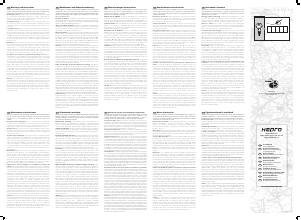
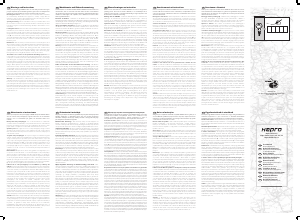
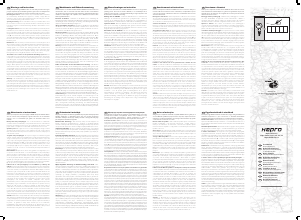
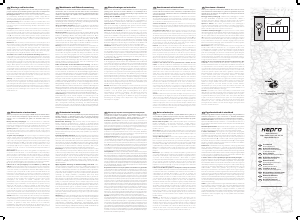
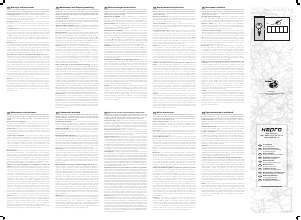
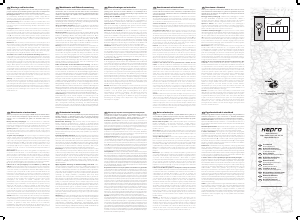
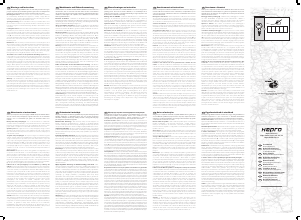
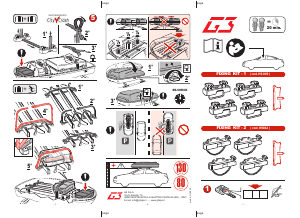
Присоединиться к беседе по данному изделию
Здесь вы можете поделиться тем, что думаете о Hapro Zenith 6.6 Автобокс. Если у вас есть вопросы, сначала внимательно прочтите инструкцию. Запросить руководство можно с помощью контактной формы.
ответить | Это было полезно (0) (Переведено Google)